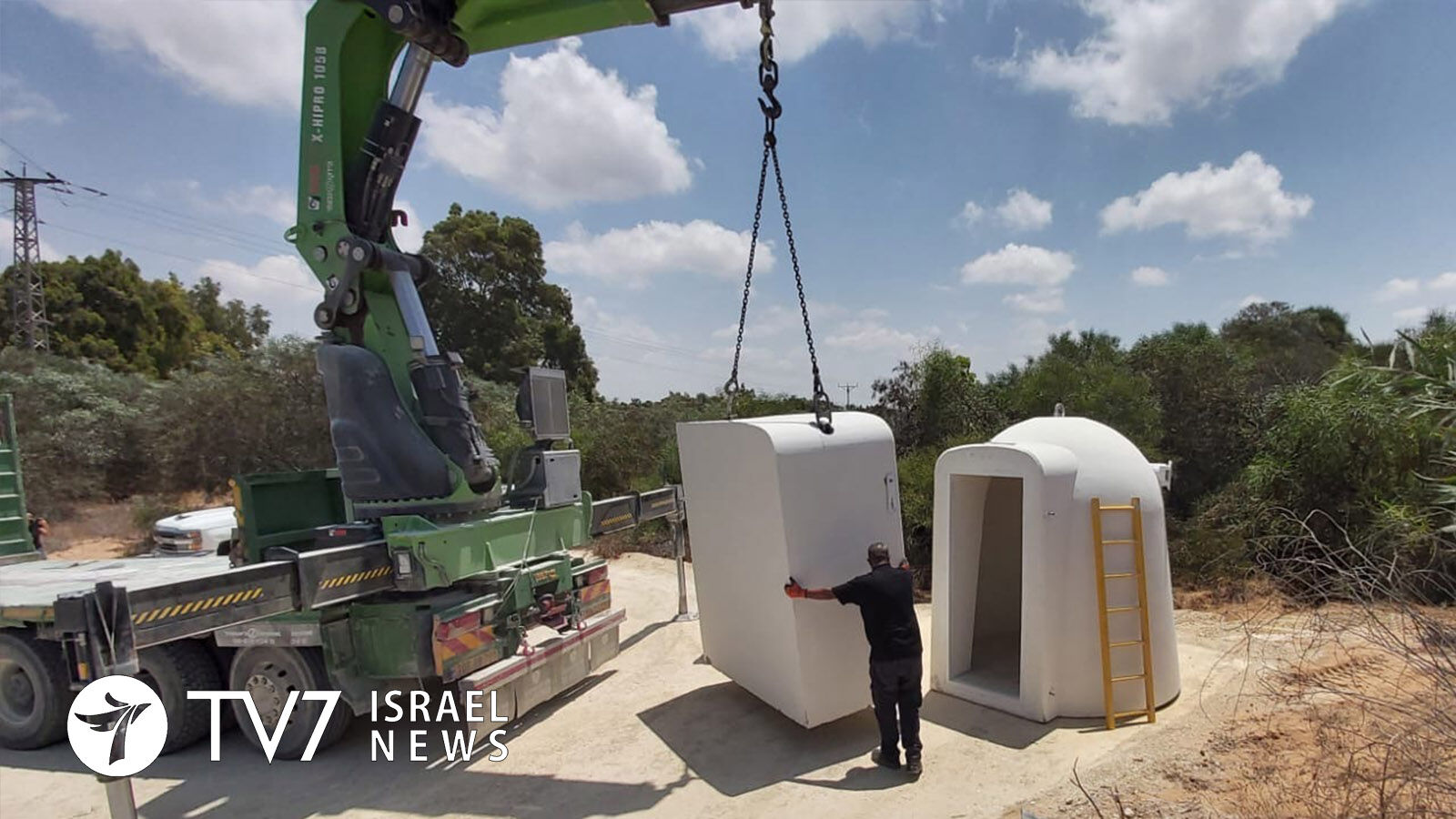The International Christian Embassy Jerusalem (ICEJ) is currently delivering the new refuges to vulnerable Israeli border communities in an effort funded by Christians worldwide.
By Erin Viner
The three-dozen mobile safe havens are designed to protect civilians in the south from Hamas rocket fire emanating with Gaza, as well as in the north along the frontier with Lebanon launched by the Hezbollah terror organization. Grateful recipients include both Jewish and Arab citizens of Israel.
“Many Israelis living along the Gaza border have told us that these mobile bomb shelters indeed save lives and give their families the peace of mind they need to continue their daily lives under the constant threat of rocket attacks,” said ICEJ President Dr Jürgen Bühler. “We now want to focus more on the need for additional bomb shelters to protect civilians in the North. The existing public shelters are not enough, and these portable shelters are an effective way to provide greater security to the smaller towns and villages in the Galilee and Haifa regions that are often overlooked.”
The destinations, conducted in consultation with local authorities, security leaders and social agencies, include Haifa, Kfar Maccabi, 2 kindergartens at Kibbutz Usha, the guard tower of Kibbutz Nahal Oz, a soccer field at Kibbutz Beror Chayil, a museum and café at Kibbutz Or HaNer, the security gate of Kibbutz Nir Am the tomato packing farm at Moshav Mictachim, 2 for the Israel Tennis Center facilities in Akko (Acre) where Jewish and Arab youths from disadvantaged families train in sport,
“In selecting where to place these shelters, the Christian Embassy looks to meet other social needs in the community as well, such as helping the tennis center in Akko which gives sports lessons to disadvantaged youths,” emphasized Dr Bühler, saying that the ICEJ is “pleased to promote Jewish-Arab coexistence by sharing these shelters among the diverse communities in the North.”
Donations for the shelters have all been raised within the past 6 months since Hamas and other Gaza-based terror groups fired thousands of missiles at the Jewish State during last May’s Operation Guardian of the Walls, said ICEJ Vice President and Senior International Spokesman David Parsons in a statement. 13 Israelis were killed during the conflict. Contributions poured in from Christian supporters “in dozens of countries, most notably from Brazil, Canada, China, Czech Republic, Fiji, Germany, Ireland, Netherlands, South Africa, Switzerland, the United Kingdom and United States,” he revealed.
The latest mission, conducted in partnership with Operation Lifeshield (OFL), brings the total number of shelters the ICEJ has donated this year alone to 46; and 161 since 2008 to Israelis living under the threat of missile attacks. A majority of 130 have been installed in Israeli areas near Gaza stretching from Kerem Shalom in the south all the way up through Sderot and Ashkelon, with the remainder in the north. Most have been donated to schools, child daycare facilities, medical clinics, youth centers, community halls, university campuses, factories and other public spaces that would be unable to operate during times of crisis without adequate bomb shelters.
The OFL non-profit was launched by two Israeli immigrants from the US in the wake of the 2006 Second Lebanon War after they were forced to closed down their construction site in the Galilee due to a lack of available shelters to seek cover. The organization works to provide portable bomb shelters designed according to IDF specs to communities and public places without adequate protection that have also had to suspend activities during times of emergency. OFL has been run for many years by Rabbi Shmuel Bowman of Efrat.
Mr. Parsons told TV7 that, “Without the bomb shelters we have helped to provide to Israeli towns and villages along the Gaza border, more lives would have been lost and many families would have abandoned their communities years ago for safer areas in Israel. The shelters save lives and livelihoods and help give the peace of mind these front-line kibbutzim and moshavim need to stay put.” He also emphasized that the ICEJ also places emphasis on trying “to serve additional social purposes when placing these shelters, especially with youth in mind.”
Israel’s State Comptroller warned last year that 2.6 million residents in the northern sector lack access to functional bomb shelters. The annual report asserted that the state budget has provided little funding to add new or improve existing shelters due in part to the instability of Israel’s government in recent years, as well as the priority given to resupplying the IDF Iron Dome anti-missile defense system.
Stressing that the need for more shelters is “most acute in the towns right along the northern border with Lebanon, which are prone to shorter range rockets that cannot be stopped by the Iron Dome system,” the ICEJ has stepped up efforts “to assist towns in the northern Galilee and Haifa regions” that encompass “the most vulnerable communities,” described as “a diverse mosaic of Jewish, Arab and Druze towns which are desperately looking for funding to provide better protection.”
Other at-risk areas are the Jewish and Arab farming villages in the Zevulun Regional Council just east of Haifa, located near strategic facilities such as oil storage tanks and chemical plants that the Iran-backed Hezbollah terror group has threatened to target in any future conflict.
